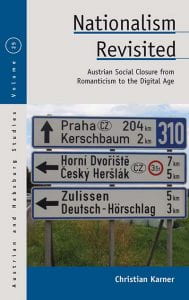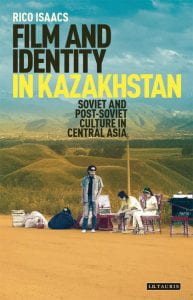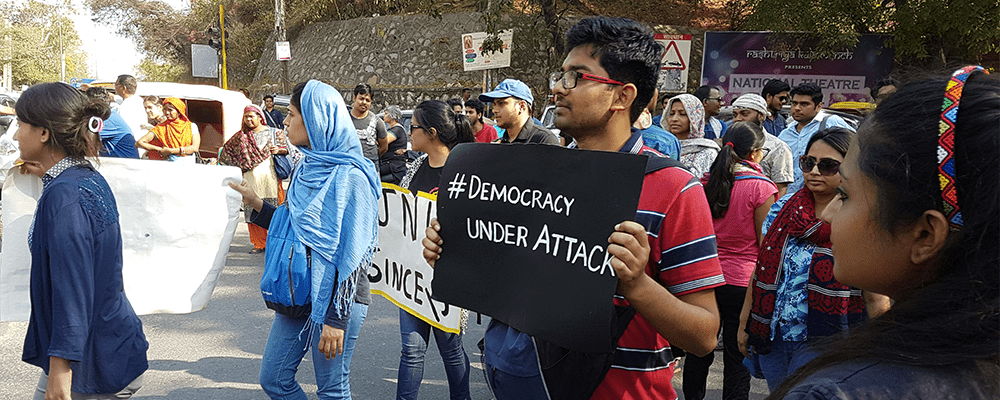Constructions and (attempted) deconstructions of ‘memory nationalism’: Central European lessons
Christian Karner
Re-appropriating J.L. Austin’s ‘speech act theory’ for memory studies, this article proposes that ‘memory acts’ describe the work performed by ideologically disparate evocations of different pasts for the purposes of ‘doing things with cultural memories’ in the present. This is used to rethink Avishai Margalit’s distinction between an ‘ethics-’ and a ‘morality of memory’: through nationalist/ethnic memory acts the ‘communities of memory’ presupposed by Margalit are constructed; conversely, transnational memory acts are discursive/symbolic means, through which a dialogical, inter-ethnic morality of memory becomes possible. This is briefly contextualized vis-à-vis seminal scholarship on the nationalist reification of ethno-linguistic boundaries since the late nineteenth century across Habsburg Central Europe and on the limits of this hegemonic ‘memory nationalism’. The discussion focuses on examples of transnational memory acts evident in Austria since the 1980s and, more narrowly, today. Those include cross-border initiatives, a street magazine, and museum exhibitions dedicated to re-remembering localities and regions outside of the ‘nation-state container’.
The Competing Politics of Austrian Glocalization: Covid-19, Crime, and (Anti-)Racism
Christian Karner
Based on a carefully contextualised discussion of discursive and semiotic contributions to public debate in Austria during the politically charged summer of 2020, this article captures ideologically different, at times mutually opposed glocalizing strategies. The social sites and entanglement of “the global” and “the local” examined are the following: a parliamentary address in which neo nationalist rhetoric is framed by global points of reference; local appropriations of the Black Lives Matter movement for the purposes of symbolic protest against public monuments commemorating problematic regional histories; and recent public debates in Austria that illustrate the glocalization of everyday politics. In each example, global contexts provide crucial momentum for the articulation of local concerns and mobilisations. The ensuing analysis helps illuminate some of the distinctly transnational, enabling conditions for ideological contest in Austria today. In methodological terms, the discussion demonstrates that an understanding of locally specific appropriations of a diversity of global flows demands ethnographic sensitivity, historical contextualisation, and local knowledge.
 Nationalism Revisited: Austrian Social Closure from Romanticism to the Digital Age
Nationalism Revisited: Austrian Social Closure from Romanticism to the Digital Age
Christian Karner
Focused on the German-speaking parts of the former Habsburg Empire, and on present-day Austria in particular, this book offers a series of highly innovative analyses of the interplay of nationalism’s discursive and institutional facets. Here, Christian Karner develops a distinctive perspective on Austrian nationalism over the longue durée, tracing nationalistic ways of thinking and mobilizing from the late eighteenth century to the present. Through close analyses of key texts representing diverse settings and historical episodes, this book traces the connections, continuities and ruptures that have characterized the varieties of Austrian nationalism.
https://berghahnbooks.com/title/KarnerNationalism
The Impact of Moral Values on the Meaning of the Borders and the Membership Status of MigrantWorkers
This research analyses the impact of moral values on the meaning of the concept of territorial borders and the membership status of migrant workers through the lens of the moral constructivist approach. It suggests that shared values sit at the core of the states’ migration policies and law-making processes. States are not merely random collections of people that become a collective being but are communities of value that are consist of individuals who have shared values. Migrant workers’ status is determined by their membership to ‘community of value4’ which arguably comprise of persons who use ‘porous values’ and/or‘impermeable values’ to shape the legal terminology at the state level. The paper focuses on the case studyof Turkey for the analysis of migration policy which concludes that socially constructed values influence thestate policies and define borders and membership status of migrant workers. For the analysis, it usesprimary data from interviews and participant observation; and secondary data from official legal documents collected in Turkey.
Sonmez Efe, S. (2020) ‘The Impact of Moral Values on the Meaning of Borders and Membership Status of Migrant Workers’. Göç Dergisi, Vol: 7: 1, pp. 11 – 36. ISSN: 2054-7110. Transnational Press London.
How far do moral values shape the legal terminology used in international conventions concerning migrant workers?
The international labour migration is arguably one of the most contentious areas of politics of migration. The states’ policies are usually dominated by the terminology that adopt ‘restrictive approach’ to admissions, residence, and rights of migrant workers. States’ unwillingness for taking a rights-based approach to labour migration arguably contributes to this approach, which has become a globally accepted phenomenon. This paper suggests that the legal terminology concerning migrant workers adopted by international conventions plays a crucial role for states’ policies approach taken under their jurisdiction. There is a lack of unified moral approach to this issue because states are given full responsibility by the International Law to design their own immigration policies. Thus, states have freedom to use national and/or moral values when designing their policies of admissions, residence and rights of migrant workers. In this context, the paper argues that socially constructed moral values are central in creating international conventions and conceptualising the status and rights of migrant workers. Thus, the values have a grave impact on the legal terminology adopted by the international conventions and are crucial in terms of recognition the status of migrant workers and protection of their rights at state level.
Sonmez Efe S. (2020) ‘How far do moral values shape the legal terminology used in international conventions concerning migrant workers?’; in Castro, E.L.F. and Marques, S.M.T. (eds) Current Challenges in Migration Policy and Law; Chapter 2. United Kingdom. Transnational Press London.
 Film and Identity in Central Asia
Film and Identity in Central Asia
 Nationalism Revisited: Austrian Social Closure from Romanticism to the Digital Age
Nationalism Revisited: Austrian Social Closure from Romanticism to the Digital Age